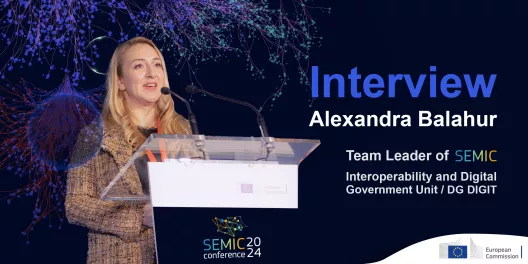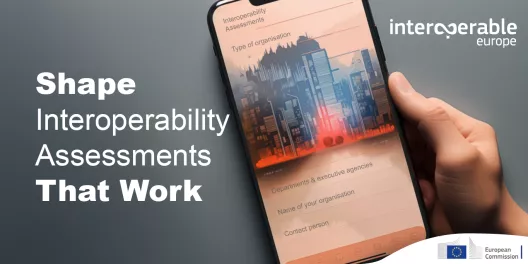Interview with Alexandra Balahur
Alexandra Balahur is the team leader of SEMIC, the semantic interoperability project and community in the Interoperability and Digital Government Unit of the Commission’s Directorate-General for Digital Services (DG DIGIT). Her primary role involves coordinating efforts in semantic interoperability within her unit and bridging activities with other teams, such as Digital-Ready Policymaking, Open Source, and others. Additionally, she collaborates with other units engaged in data spaces and other Commission Directorates, such as DG GROW and the Publication Office (OP), linking semantic…
New report on the Future of the European Single Market
A recently released report by former Italian Prime Minister Enrico Letta offers a visionary outlook on the future of the European Single Market. The document, commissioned by the European Council and the Commission, proposes strategic enhancements aimed at revitalising the market to meet the demands of a larger, more complex global environment. Notably, the report emphasises the critical role of the Interoperable Europe Act in achieving a seamless Digital Single Market.Since its inception over thirty years ago, the Single Market has been fundamental to European economic integration and…
Interoperable Europe Act enters into force
Today, 11 April 2024, the Interoperable Europe Act has officially become part of the EU’s legal order, as well as that of every Member State. From the Island of Madeira to the city of Helsinki, its new provisions, most of which will apply within three months, will mark the beginning of a process whereby public administrations in the EU will fundamentally level-up their public sector interoperability. "I am very pleased to see the Interoperable Europe Act in place, fulfilling the calls for better, interoperable digital public services in the EU, says European Commissioner for Budget and…
Interoperability Assessments Guidelines: Your Questions Answered
Starting from the beginning of 2025, the upcoming Interoperable Europe Act (IEA) introduces mandatory interoperability assessments for the digital public services of European public administrations involving cross-border data exchange. This requirement (set out in Article 3 of the Act) will be applicable for the EU institutions, EU Member States, as well as for public administrations at the regional and local level. In preparation for this, efforts to draft guidelines for these assessments have commenced, with the objective of establishing best practices that maximise benefits while minimising…
EU Parliament and Council adopt the Interoperable Europe Act
The plenary assembly of the European Parliament had its first reading on the Interoperable Europe Act proposal on Monday the 5th and Tuesday the 6th of February. With a very large majority, Parliament overwhelmingly approved the Act. One month later, all 27 EU Member States adopted the deal unanimously in the EU Council.Of the 639 Members of the European Parliament who attended the vote on the Interoperable Europe Act on Tuesday 5 February, 524 MEPs supported the Act, with only 18 voting against it. This outcome was preceded by an agreement on the Act reached in trilogue negotiations between…
Call for action: Shape the future interoperability assessments!
Starting from the beginning of 2025, the upcoming Interoperable Europe Act introduces mandatory interoperability assessments for the digital public services of European public administrations involving cross-border data exchange. This requirement (set out in Article 3 of the Act proposal) will be applicable for the EU institutions, EU Member States, as well as for public administrations at the regional and local level. The Interoperability assessments are crucial instruments in order to discover efficient ways towards more cross-border interoperability among European public administrations…
Interview with Claudia Oliveira
Claudia Oliveira is a Programme Manager at the European Commission. She joined the Interoperable Europe Unit of DG DIGIT in December 2022 and since then is responsible for the interoperability monitoring mechanism and its transformation in the context of the Interoperable Europe Act and the Digital Decade Policy Programme. Additionally, she contributes to the pre-accession discussions with the Western Balkans and any matter related to international organisations and third countries. Her current position is a continuation of her lifelong professional mission—to be a public servant in the…
2023 in Review: Momentum for Interoperable Europe
As we bid farewell to 2023, it's time to reflect on a year that has been nothing short of transformative for the landscape of public sector interoperability within the European Union. This year stands as a testament to the incredible strides made in fostering a digitally connected and efficient Europe. It's a narrative of overcoming challenges, embracing innovation, and cultivating a collaborative spirit that has driven the European Commission's Interoperability team.In this review, we're not just chronicling achievements; we're celebrating a journey of relentless pursuit towards a vision of…
Workshop for early-career researchers at SEMIC: Deadline extended
***Update: The deadline for submitting your abstracts has been extended to 15 May***We are inviting early career researchers (in their individual capacity) to submit abstracts of their research and present it at one of our SEMIC 2024 pre-conference workshops. “Interoperable Europe: From Vision to Reality”, the latest edition of the annual SEMIC conference, returns to Brussels on 27 June. Registration for the main event and the pre-conference workshops on 26 June has already started. SEMIC is organised by the European Commission in collaboration with the Belgian Presidency of the Council of the…
“OSOR Turns 15” Conference: Highlights
On the 21st of November 2023, in the heart of Brussels, a landmark event celebrated the 15th anniversary of the European Commission’s Open Source Observatory (OSOR). The conference, titled “OSOR Turns 15: From Pioneering to Mainstreaming Open Technologies in Public Services,” brought together many of the brightest minds in the use of open source. A full conference room with 274 attendees witnessed the transformative journey of open source in public services. The event highlighted the significant achievements of open source communities, paying tribute to the innovators and visionaries who have…
Political agreement on the Interoperable Europe Act
The European Council and the European Parliament have reached a common position on the Interoperable Act. This means the Interoperable Europe Act proposal can be finally transformed into EU law by both institutions. The Commissioner for Budget and Administration, Johannes Hahn, gladly welcomed the provisional agreement, stating: "With the swift conclusion of the negotiations on the Interoperable Europe Act, in less than one year after the Commission proposal, the Council and European Parliament demonstrate their eagerness to boost the digital transformation of public services. This brings…
Record number of participants for SEMIC 2023
SEMIC 2023, the Semantic Interoperability Conference, organised by the European Commission in collaboration with the Spanish Presidency of the Council of the European Union, achieved an all-time high with 458 on site visitors and 803 followers online. Compared to SEMIC 2022, SEMIC 2023 experienced a substantial rise of 23% of participants who attended the conference in person, while the online viewership grew by 3%. Insights from leading figures In addition, the event benefitted from the attention of multiple eminent speakers who took the opportunity to make newsworthy announcements. EU…
Pagination












